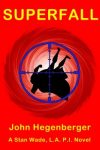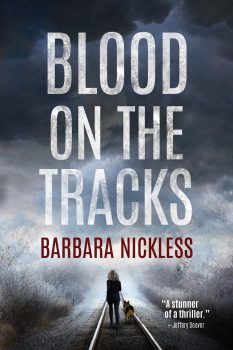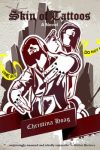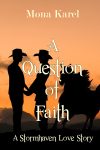

October 10 – 16: “Print books vs. an E-Reader?
 This week we’re joined by ITW Members Benjamin Dancer, John Hegenberger, Christina Hoag, Margo Kelly, Mona Karel, Barbara Nickless, Lisa Turner, R.G. Belsky and Arthur Kerns as they discuss print books vs. E-Readers: Do you prefer to read a print book, or on an E-Reader, and why?”
This week we’re joined by ITW Members Benjamin Dancer, John Hegenberger, Christina Hoag, Margo Kelly, Mona Karel, Barbara Nickless, Lisa Turner, R.G. Belsky and Arthur Kerns as they discuss print books vs. E-Readers: Do you prefer to read a print book, or on an E-Reader, and why?”
~~~~~
 Benjamin Dancer is the author of the literary thriller Patriarch Run, the first book in a series that will include Fidelity and The Story of the Boy. He also writes about parenting, education, sustainability and national security. Benjamin works as an Advisor at a Colorado high school where he has made a career out of mentoring young people as they come of age. His work with adolescents has informed his stories, which are typically themed around fatherhood and coming-of-age.
Benjamin Dancer is the author of the literary thriller Patriarch Run, the first book in a series that will include Fidelity and The Story of the Boy. He also writes about parenting, education, sustainability and national security. Benjamin works as an Advisor at a Colorado high school where he has made a career out of mentoring young people as they come of age. His work with adolescents has informed his stories, which are typically themed around fatherhood and coming-of-age.
 Margo Kelly is a native of the Northwest who now lives in Idaho. Her award-winning debut, Who R U Really?, was published by Merit Press in 2014. Her second novel, Unlocked, released October 1, 2016. A veteran public speaker, Margo welcomes opportunities to speak to youth groups, library groups, and book clubs.
Margo Kelly is a native of the Northwest who now lives in Idaho. Her award-winning debut, Who R U Really?, was published by Merit Press in 2014. Her second novel, Unlocked, released October 1, 2016. A veteran public speaker, Margo welcomes opportunities to speak to youth groups, library groups, and book clubs.
 Award-winning author, John Hegenberger has produced more than a dozen books since mid-2015, including several popular series: Stan Wade LAPI in 1959, Eliot Cross Columbus-based PI in 1988, and Ace Hart, western gambler in Arizona in 1877. He’s the father of three, tennis enthusiast, collector of silent films, hiker, Francophile, B.A. Comparative Lit., ex-Navy, ex-marketing exec at Exxon, AT&T, and IBM; and happily married for 46 years and counting. Active member of SFWA, PWA, SinC and ITW. His novel SPYFALL won a 2016 award at Killer Nashville.
Award-winning author, John Hegenberger has produced more than a dozen books since mid-2015, including several popular series: Stan Wade LAPI in 1959, Eliot Cross Columbus-based PI in 1988, and Ace Hart, western gambler in Arizona in 1877. He’s the father of three, tennis enthusiast, collector of silent films, hiker, Francophile, B.A. Comparative Lit., ex-Navy, ex-marketing exec at Exxon, AT&T, and IBM; and happily married for 46 years and counting. Active member of SFWA, PWA, SinC and ITW. His novel SPYFALL won a 2016 award at Killer Nashville.
 Barbara Nickless worked as a raptor rehabilitator, instructional designer, technical writer, astronomy instructor, sword fighter and piano teacher before turning to writing. Now an award-winning author, she lives in Colorado where she loves to snowshoe, cave, hike and drink single malt Scotch—usually not at the same time. She is the author of the Special Agent Parnell series featuring a railroad cop and her K9 partner.
Barbara Nickless worked as a raptor rehabilitator, instructional designer, technical writer, astronomy instructor, sword fighter and piano teacher before turning to writing. Now an award-winning author, she lives in Colorado where she loves to snowshoe, cave, hike and drink single malt Scotch—usually not at the same time. She is the author of the Special Agent Parnell series featuring a railroad cop and her K9 partner.
 Christina Hoag is the author of Skin of Tattoos, a literary thriller set in L.A.’s gang underworld forthcoming from Martin Brown Publishers, and Girl on the Brink, a romantic thriller for young adults forthcoming from Fire and Ice YA/Melange Books. She is a former reporter for the Associated Press and Miami Herald and worked as a correspondent in Latin America writing for major media outlets including Time, Business Week, Financial Times, the Houston Chronicle and The New York Times. She is the co-author of Peace in the Hood: Working with Gang Members to End the Violence, a groundbreaking book on gang intervention (Turner Publishing, 2014). She resides in Los Angeles.
Christina Hoag is the author of Skin of Tattoos, a literary thriller set in L.A.’s gang underworld forthcoming from Martin Brown Publishers, and Girl on the Brink, a romantic thriller for young adults forthcoming from Fire and Ice YA/Melange Books. She is a former reporter for the Associated Press and Miami Herald and worked as a correspondent in Latin America writing for major media outlets including Time, Business Week, Financial Times, the Houston Chronicle and The New York Times. She is the co-author of Peace in the Hood: Working with Gang Members to End the Violence, a groundbreaking book on gang intervention (Turner Publishing, 2014). She resides in Los Angeles.
 Mona Karel is the writing alter ego of Monica Stoner, who wrote Beatles fan fiction and terribly earnest (read just not very good) Gothics in her teen years. She set aside writing while working with horses and dogs all over the US, until she discovered used book stores and Silhouette Romances. Shortly after that she also discovered jobs that paid her for more than her ability to do a good scissors finish on a terrier, and moved into the “real” working world. Right around then she wrote her first full length book. It only took her twenty seven years after that to be published, and not that book! She writes looking out the window at the high plains of New Mexico, with her Saluki dogs sprawled at her feet. Distraction much?? Sometimes these silly dogs take over her life, but there is always room for one more set of characters in one more book.
Mona Karel is the writing alter ego of Monica Stoner, who wrote Beatles fan fiction and terribly earnest (read just not very good) Gothics in her teen years. She set aside writing while working with horses and dogs all over the US, until she discovered used book stores and Silhouette Romances. Shortly after that she also discovered jobs that paid her for more than her ability to do a good scissors finish on a terrier, and moved into the “real” working world. Right around then she wrote her first full length book. It only took her twenty seven years after that to be published, and not that book! She writes looking out the window at the high plains of New Mexico, with her Saluki dogs sprawled at her feet. Distraction much?? Sometimes these silly dogs take over her life, but there is always room for one more set of characters in one more book.
 Edgar finalist Lisa Turner is a Southern mystery author fascinated by good people who do wicked things. She examines human nature against the rich backdrop of Memphis and the Mississippi Delta. Her second novel, Edgar nominated The Gone Dead Train, delves into long buried secrets of Memphis’s civil rights struggles and the power of Santeria magic. Turner’s mysteries coil the roots of Southern identity around her characters and then drag them into a world of blues, murder, and heartbreak. “I’m a story archeologist,” she says. “I keep digging into my characters until I strike the bone.”
Edgar finalist Lisa Turner is a Southern mystery author fascinated by good people who do wicked things. She examines human nature against the rich backdrop of Memphis and the Mississippi Delta. Her second novel, Edgar nominated The Gone Dead Train, delves into long buried secrets of Memphis’s civil rights struggles and the power of Santeria magic. Turner’s mysteries coil the roots of Southern identity around her characters and then drag them into a world of blues, murder, and heartbreak. “I’m a story archeologist,” she says. “I keep digging into my characters until I strike the bone.”
 R.G. Belsky is an author of crime fiction and a journalist in New York City. His new suspense thriller, BLONDE ICE, will be published by Atria on October 18, 2016. It is the latest in a series of books from Atria featuring Gil Malloy, a hard-driving newspaper reporter with a penchant for breaking big stories on the front page of the New York Daily News. The first book in the Gil Malloy series – THE KENNEDY CONNECTION – was published in 2014 and SHOOTING FOR THE STARS came out in 2015. Belsky himself is a former managing editor at the Daily News and writes about the media from an extensive background in newspapers, magazines and TV/digital news. At the Daily News, he also held the titles of metropolitan editor and deputy national editor. Before that, he was metropolitan editor of the New York Post and news editor at Star magazine. Belsky was most recently the managing editor for news at NBCNews.com. His previous suspense novels include PLAYING DEAD and LOVERBOY.
R.G. Belsky is an author of crime fiction and a journalist in New York City. His new suspense thriller, BLONDE ICE, will be published by Atria on October 18, 2016. It is the latest in a series of books from Atria featuring Gil Malloy, a hard-driving newspaper reporter with a penchant for breaking big stories on the front page of the New York Daily News. The first book in the Gil Malloy series – THE KENNEDY CONNECTION – was published in 2014 and SHOOTING FOR THE STARS came out in 2015. Belsky himself is a former managing editor at the Daily News and writes about the media from an extensive background in newspapers, magazines and TV/digital news. At the Daily News, he also held the titles of metropolitan editor and deputy national editor. Before that, he was metropolitan editor of the New York Post and news editor at Star magazine. Belsky was most recently the managing editor for news at NBCNews.com. His previous suspense novels include PLAYING DEAD and LOVERBOY.
 Arthur Kerns is a retired FBI supervisory special agent and past president of the Arizona chapter of the Association of Former Intelligence Officers (AFIO). His award-winning short fiction has appeared in numerous anthologies. He is a book reviewer for the Washington Independent Review of Books. Diversion Books, Inc. NY, NY published his espionage thriller, The Riviera Contract, and the sequel, The African Contract. The third in the series, The Yemen Contract, was released in June 2016.
Arthur Kerns is a retired FBI supervisory special agent and past president of the Arizona chapter of the Association of Former Intelligence Officers (AFIO). His award-winning short fiction has appeared in numerous anthologies. He is a book reviewer for the Washington Independent Review of Books. Diversion Books, Inc. NY, NY published his espionage thriller, The Riviera Contract, and the sequel, The African Contract. The third in the series, The Yemen Contract, was released in June 2016.
- LAST GIRL MISSING with K.L. Murphy - July 25, 2024
- CHILD OF DUST with Yigal Zur - July 25, 2024
- THE RAVENWOOD CONSPIRACY with Michael Siverling - July 19, 2024
